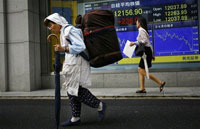Global markets in mixed reactions after USA’s 700-billion-dollar proposal
Global markets were mixed Monday after the U.S. government proposed a US$700 billion plan to solve the world financial crisis by rescuing banks from billions of dollars in risky mortgage debt.

European markets, after edging higher in early trading, had fallen by afternoon in Europe. Britain's FTSE 100 lost 0.39 percent to 5,290.82, Germany's DAX slumped 0.30 percent to 6,170.83 and France's CAC 40 dropped 0.11 percent to 4,320.01.
"There was massive reaction on Friday, today there is an element of profit-taking and a bit of reality of people worrying about the world economy as we see the price of oil move higher again," said Stephen Pope, chief global markets strategist for Cantor Fitzgerald.
"As the week develops there should be some concrete proposals coming through," he added.
In Asia, investors were more upbeat. In Japan, the Nikkei 225 index climbed 1.4 percent to close at 12,090.59 points, while Hong Kong's Hang Seng Index rose 1.6 percent to 19,632.20.
In China, the Shanghai Composite Index soared 7.8 percent on hopes of a turnaround after government steps to stabilize the country's beaten down shares. Markets in Australia and Taiwan advanced strongly after their regulators issued curbs on short selling, following similar moves in the U.S., Britain and other countries. The practice, which bets on a stock's decline, has been partly blamed for driving down share prices.
Global markets had rallied Friday on news Washington was likely to enact a bailout plan, calming investors worried that losses from bad bets on mortgages could bring about the collapse of more companies, straining an already weakened financial system and global economy.
As a rough outline of the plan took shape over the weekend, the Bush administration continued to lobby lawmakers Sunday for authority to use US$700 billion to buy up a mountain of bad debt at the heart of the crisis.
While the proposed bailout lifted sentiment for the time being, there were still a number of uncertainties about the plan and the general health of financial firms that could further unsettle markets in the coming days, an analyst said.
"This should stem the bleeding, but the patient is still very fragile," said Thomas Lam, a senior economist at the United Overseas Bank in Singapore. "The list of uncertainties is pretty long."
Meanwhile, cash demand showed some signs of easing as European central banks offered more liquidity to money markets.
According to the Bank of England, it offered US$40 billion in a one-day tender, for which the bank said it received US$26 billion in bids, but didn't indicate from how many banks.
But the European Central Bank said it received bids worth US$82.1 billion for the US$40 billion it offered in a one-day transaction, or more than double what it had offered.
Japan's central bank pumped another 1.5 trillion yen (US$14.1 billion) into short-term money markets, the ninth injection over five straight working days.
Monday's moves come after central banks in Britain, Canada, the United States, Japan and Canada last week supplied cash to banks that had become wary of lending to one another in the aftermath of the bailout of AIG and the bankruptcy of Lehman Brothers. Banks have been increasingly reluctant to lend to each other as distrust spread throughout the financial system.
Financial stocks, battered in recent weeks, were among leaders in Asia.
Japanese banking giant Mitsubishi UFJ Financial Group Inc. shot up more than 5.2 percent, while leading Australian firm Macquarie Group Ltd. climbed 5.3 percent. In Hong Kong, Industrial & Commercial Bank of China, the country's biggest, was up 2.4 percent.
In mainland China, share prices surged on strong buying of financial shares after the government announced plans to buy shares in major state-owned banks and other measures.
After watching share prices slide for almost a year, the government moved to support the stock market last week in response to the global financial crisis triggered by problems with bad debt in the U.S.
Comments by Premier Wen Jiabao over the weekend urging support for the financial system and market stability also boosted buying sentiment, analysts said.
"According to our analysis, this could be a turning point for the market, not just a brief rebound," said Zhang Xiuqi, a strategist for Guotai Junan Securities in Shanghai. "Market sentiment is finally recovering."
The Shanghai benchmark still is down 57 percent for the year.
Elsewhere, Australia's &P/ASX 200 index jumped 4.5 percent and Taiwan's benchmark rose 2.3 percent.
In Russia, stocks inched up following big gains for all indexes last week, with the U.S. dollar-denominated RTS adding 1.6 percent.
The advances came after an another extraordinary rally on Wall Street on Friday. The Dow Jones industrials soared about 370 points, or 3.35 percent, to 11,388.44, giving the index a gain of about 780 points over two days.
U.S. stock index futures were down, though, suggesting Wall Street may open lower. The S&P 500 futures index was down 8.3 points, or 0.7 percent, to 1,237.2.
Light, sweet crude for October delivery was up US$1.41 to US$105.96 a barrel in electronic trading on the New York Mercantile Exchange by afternoon in Europe. The contract soared US6.67 Friday.
Subscribe to Pravda.Ru Telegram channel, Facebook, RSS!


